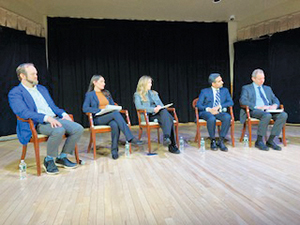
The panel was co-sponsored by New Jersey Division On Civil Rights, the New Jersey Department of Justice, Jewish Federation of Northern NJ, the Anti-Defamation League, and Temple Emanu-El in Closter.
A seasoned panel of experts representing several agencies convened at the Kaplen JCC before a surprisingly poorly attended audience of less than 30 people last Wednesday evening in Tenafly.
The panel was expertly moderated by Donna Weintraub, a current board member of the JFNNJ who has also served for more than 10 years on the school board of the Haworth, New Jersey K-8 district. Of all of her credentials as moderator, Weintraub expressed that the primary focus and passion of her involvement is that she loves children and cares deeply for the safety and quality of education for all school children.
“Every student deserves a safe learning environment [in school.] Every student should be afforded an environment where they can feel confident to bring their full self to their academics in order to maximize their education,” said Weintraub.
The stated goal of the panel was to: “Provide vital tools for parents, teachers and school administrators to help respond to the surge in antisemitic incidents in schools.” And that they did. The information and procedure guidelines provided by each of the experts were specific and concise but comprehensive.
However, one was left to wonder about the level of impact they could have with an audience of less than 30 people. One was further left to wonder where the public school administrators, teachers and parents were who needed to hear and know this vital information. Depending on how it is counted, northern New Jersey has 10-12 counties. Can it be that only 30 people noticed or felt the upsurge in incidents and negative impact?
Many Orthodox families also have children that attend public schools for reasons relating to special needs other than necessary accommodations. While it could be that some of the attendance was trumped by a Teaneck School Board meeting taking place concurrently, it was a meager turnout for an issue that has become pervasive, tolerated and somewhat shameless in the public schools and on college campuses, especially since Oct. 7.
All of the panelists emphasized how they collaborate in sharing information in order to respond timely and appropriately to reports of antisemitic incidents, harassment and hostility that occur in schools. They also agreed that incidents are underreported for various reasons — one being fear of retaliation — and that the report statistics fall short of reality.
Panelist Rabbi Jeremy Ruberg serves as rabbi for lifelong learning at Temple Emanu-El in Closter. He pointed out that based on his interactions with hundreds of students in their program, one obstacle to reporting is related to students’ lack of recognition. Sometimes students might not even realize that some subtle remark, or “micro aggression,” was actually biased, an antisemitic trope or hostile.
Sundeep Iyar, director of New Jersey’s Division on Civil Rights (DCR), a division of the New Jersey Attorney General’s Office, said that New Jersey has one the oldest and strongest laws to address discrimination. He noted that his office tracks bias incident data both nationally and with the ADL, including reports of any adverse action based on protected status such as shared ancestry.
Lauren Numeroff, senior attorney in the New York regional office of the U.S. Department of Education’s Office for Civil Rights (OCR), noted that under Title VI, public schools have a mandated obligation to report speech and conduct that present a hostile environment, intimidation or harassment based on offensive speech, even if that speech is protected by the First Amendment. Iyar supported this comment by adding that schools are also mandated to have a structured protocol for reporting that allows only two days to inform parents of victims and perpetrators, as well as the school’s administrative up line, and must complete the process and submit a report to the appropriate agency within 10 days.
This issue in and of itself seems to be in question in a current investigation where the school administrators and school board possibly failed both to protect ancestral rights, prevent bias and intimidation creating a hostile environment, and also possibly failed to report any incident at all to the appropriate agencies. While consequences for a breach of the law and/or failure to report was not discussed extensively by the governmental panelists, Iyar stated they do exist and are tied to monetary penalties.
Michael Campion, chief of the New Jersey U.S. Attorney’s Office Civil Rights Division, emphasized the importance of reporting incidents to all three “sister” offices: federal, state and the county prosecutor. He emphasized that the bar is high on prosecuting hate crime accusations, but he and Iyar said they have the capability to act quickly on bias, intimidation and hostility reports, and do so.
The number of antisemitic incident reports from colleges and universities has increased exponentially, from 219 in all of 2022, which was already an increase over past years, to 500 reports just in the last three months, according to Brandi Rubin, ADL’s senior associate regional director for the New York/New Jersey region.
Weintraub recognized the Jewish Federation in general for taking a lead role and partnering with other agencies to address the rising concern and incidents of antisemitism.
Both governmental agencies offer online training for educators, parents and administrators on preventing, educating about and managing bias, intimidation and hostility in school districts. The next training is scheduled for Jan. 25 and will be led by the U.S. Attorney’s Office of Civil Rights. Registration is required.
Not every hate incident involves a crime. Community members can report any incident to the Civil Rights Division at civilrights.justice.gov.
New Jersey bias crime hotline: (800) 277-2427
To submit a complaint: www.justice.gov/action-center/report-crime-or-submit-complaint#complaint
For information about trainings: www.njoag.gov/about/divisions-and-offices/division-on-civil-rights-home
To report an incident to the Anti-Defamation League (ADL): adl.org/report.
Each agency has guidelines on whether an individual can or cannot report anonymously and how to do so.
Ellie Wolf is a staff writer at The Jewish Link.








